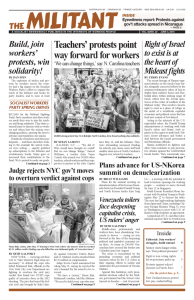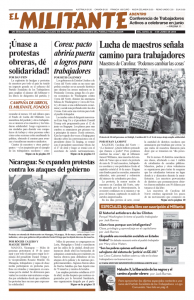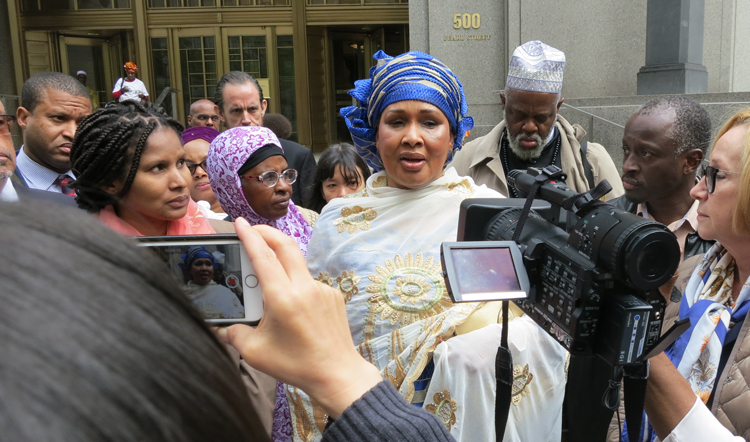NEW YORK — Carrying out their vow to “take whatever legal steps are necessary” to defend the cops who killed Mohamed Bah, officials in the New York City Law Department are fighting to overturn the civil jury verdict that found two NYPD cops guilty of excessive force in the 2012 shooting. The jury that heard the federal civil suit brought by Bah’s family against Detective Edwin Mateo and Lt. Michael Licitra awarded them $2.21 million in compensation.
Judge Kevin Castel announced his ruling May 21, saying he rejected the city’s demand for the award to be reversed.
“We have a victory,” Hawa Bah, Mohamed’s mother, told the Militant. “We need to hold every cop who murders anyone accountable. The true fight is to get justice so no other mother faces this. I hope this victory helps.”
Some 50 supporters of the Bah family packed the courtroom May 17 to oppose the city’s attempt to overturn the verdict.
“This is one of the few cases of killings at the hands of the cops that has gone to any kind of trial and the cops were found guilty,” Randolph McLaughlin, one of the Bah family’s lawyers, told supporters outside the courthouse after the hearing. “The cops who killed Eric Garner, Ramarley Graham and others never went to trial. Trying to get the ruling thrown out is rubbing salt in the wound. It’s an outrage.”
Bah, 28, was shot eight times by cops on Sept. 25, 2012. His mother had flown in from her native Guinea to see Mohamed and found him depressed and acting strangely. She called 911, asking for an ambulance to take him to a hospital. Instead, a group of heavily armed cops showed up.
They refused her repeated requests to talk to him and get him to come out. The cops made her stay outside the building while they went in and demanded Mohamed Bah open the door. When he told them he was fine and to go away, they removed a peephole in the door and tossed a chemical light through it to illuminate the room. They used a hydraulic jack to crack open the door and inserted a camera on a pole.
The cops claim that once the door was open, Mohamed Bah threatened them with a knife. But they never presented a knife as evidence, claiming it was lost. Then later they said they found it, but it had been contaminated in storage.
Once inside the apartment the cops shot at him with an anti-riot gun and used a Taser stun gun twice.
According to testimony at the trial, Detective Mateo was hit by one of the Taser shots aimed at Bah and fell to the ground. “He’s stabbing me. Shoot him,” Mateo yelled twice. Mateo and two other cops shot at Bah, hitting him at least eight times.
Then Mateo changed his story. When he was questioned by Bah family attorneys in a deposition, he admitted that the youth never stabbed him.
The cops also said the clothes worn by Mohamed Bah when he was killed had been destroyed. All the missing evidence played a role in the decision of both federal and Manhattan prosecutors to decline to indict the cops.
Then a few days into the civil trial they admitted they had the clothes all along.
“It is unforgivable to me that, either through malevolence or incompetence, this would not have been discovered,” Judge Castel said in the civil trial.
The jury found Mateo guilty of excessive use of force, and Lt. Licitra, Mateo’s supervisor, guilty of failing to properly supervise him.
In ruling on the city’s appeal, Judge Castel vacated his decision against Licitra.
At the May 17 hearing City Attorney Joshua Lax told Castel that there was “no evidence that disputed that Mr. Bah posed a threat of death or serious injury at the time Mr. Mateo fired.” This means that Mateo is entitled to “qualified immunity,” he claimed, based on laws that give cops wide latitude if they think they’re in bodily danger.
The judge challenged that assertion. He noted that Mateo has changed his story several times and that his fellow officers all claimed they didn’t see what happened before the shooting started. “It was perfectly plausible for this jury to conclude Mateo told an untruthful story,” Castel said.
After the judge ruled against their appeal, a representative of the city Law Department said, “We are reviewing the decision to determine what further action we take.”


